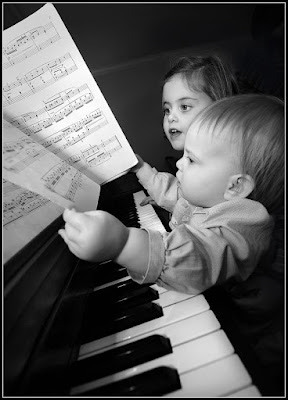So many times parents think that their child has to be able to sit perfectly still, or maybe at least pass Kindergarten. However, much like preschool, learning piano is a head start for little fingers.
I began learning piano lessons then review to lessons and made me want to pay attention during class.
A child has about the attention span of approximately how old they are .. ....
I am currently teaching a 5 year old, spunky girl! In order to keep her attention on piano lessons and not her stuffed animal, I need to make things more interesting and put lessons into sections.
What are some of the pros of having a little one play piano?
I am aware that 4 and 5 year olds have a short attention span, but it does not bother me at all! Challenges give me an adrenaline rush and I find it fun to research how to teach effectively.
My Piano Students Will Learn....
1. Mathematical Lessons
- Yes; understanding music is easy when you know math. Kids who have never been to school, will have an early start in math through music!! In order to read music, in the first lessons, students will learn all about whole, half, quarter, and eighth notes.
- Fractions Sometimes a student will not understand at first (it took me a few years until I grasped the concept), so I usually use
Legos or even food for visuals. :) - They learn beats, keeping a rhythm, and recognizing patterns
2. Opposites
- Most kids are between 4 and 5 when they begin learning opposites. In lessons, they will learn the opposite between: high and low, loud and quiet, playing and resting, long and short, etc...
- In order to make this fun and easy, students will learn terms in a unique way (with voice fluctuations)
3. How to Express Themselves
- Music is another way to express oneself. It's very important to not simply play a piece, but to play it with feeling. Many times after playing a big piece, you feel like exhaling because you put so much emotion into playing. I encourage students to not only play, but to really get into the music.
4. To Refine Discipline
- Self- Control Yes, this is a big one for kids who love moving around! However, they always seem to concentrate while playing their "Piece". Younger students love performing in front of parents and they know that playing is serious when it's in front of an audience ;)
- Patience Practicing a song takes lots of patience, hard work and dedication (this is why parental involvement is vital). There will be times when a student will not pass a song after one week of practicing, and this will honestly be discouraging for them, but it will teach patience and determination.
- Self-esteem I give constructive criticism, but never make it seem like a bad thing; it's just part of learning. However, I would rather turn negative feedback into a positive change that helps them. I dislike negativity, so I try very hard never to make a student feel like a failure. Instead, I praise the good and explain how the rough parts could improve for the next week!
5. Motor Skills
- Correct piano posture is something I am always stressing!
- Students also learn how to develop coordination.
I hope this answered a lot of questions, and also got you excited about having your kindergartener begin lessons! If you have more questions, please feel free to leave a comment or send a message!
SonataStudioColusa@gmail.com



No comments:
Post a Comment